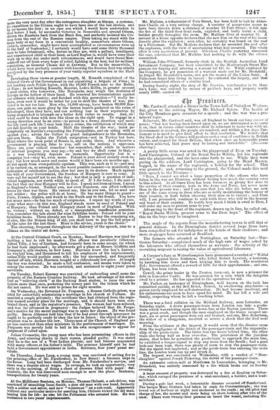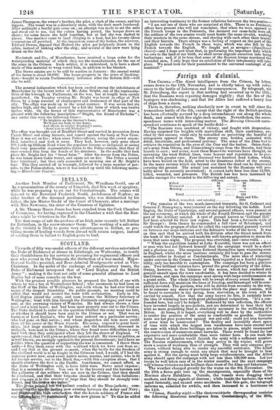VrottiurrB.
Mr. Cardwell attended a dinner in the Town-hall of Oxford on Wednes- day, given to the retiring Mayor, Mr. Richard Spiers. The health of the City Members gave occasion for a speech ; and the war was a pro- minent topic. Reluctant, Mr. Cardwell said, was all England to break our long career of peace; "but war having been forced upon us, we are determined so to carry it on, that in future other countries shall be reluctant to make war with us. Government is resolved, the people are resolved, and within a few days Par- liament is to meet to give final effect to that resolution. We believe that the blood shed in the Crimea will produce such a crop of confidence in British valour, and respect for Great Britain, that when once an honourable peace has been achieved, that peace may be lasting and inviolable." (Inunense cheering.) A pretty little scene was acted in the playground of Eton on Tuesday. Lord Carrington, Colonel of the Royal Bucks Militia, led his regiment into the playground, and the boys came forth to see. While they were gazing on the soldiers, Lord Carrington, going to the Head Master, begged, in the name of the regiment, a holiday for the school. This was granted ; and, returning to the ground, the Colonel made this neat little speech to the Etonians- " Boys, I cannot see what a large proportion of the officers who have fallen in the war are Etonians, without feeling how much the country owes to this school. At all times Eton has been foremost in giving her sons to the service of their country, both in the Army and Navy, but never more than in the present war ; and I am sure that you who are before me now are of the same stamp as those who are so nobly maintaining the honour of their country, or have fallen cheering their men on to victory ; and Eton will, I am persuaded, continue to send forth those who will be the honour and boast of their country. To testify how much I think is owed to Eton, I will order my men to present arms to you." Advancing to the front of the regiment, drawn up in line, he called out, "Royal Bucks Militia, present arms to the Eton boys." The effect of this on the boys may be imagined.
The staple of the reports from the manufacturing towns is still that of general dulness. In the Birmingham district several large firms have been compelled to ask for indulgenoe at the hands of their creditors ; and more stoppages have occurred at Bradford.
The farmers who attended at Nottingham on Saturday last—Mar- tinmas Saturday—complained much of the high rate of wages asked by the labourers who offered themselves as servants : the activity of the recruiting sergeant is raising the value of agricultural labourers.
A Coroner's Jury at Wolverhampton have pronounced a verdict of "Wilful murder" against three Irishmen, who killed Robert Leverett, a boatman, by knocking him down and then kicking him to death. The murderers fled ; Government c.ffered a reward of 150/. for their apprehension; and one, Flynn, has been taken.
Cowell, the prime leader in the Preston turn-out, is now a prisoner for debt in Lancaster Castle. He was arrested for a sum which the delegates owed to a printer. He has appealed to the operatives for aid.
Mr. Parker, an innkeeper of Birmingham, well known on the turf, has committed suicide, at the Bell Hotel, Bristol, by swallowing strychnine—a poison rarely employed for self-destruction. He had become insolvent, and his embarrassments seem to have upset his mind. He has left a wife and family, respecting whom he left a touching letter.
There was a fatal collision on the Midland Railway, near Leicester, on Saturday night. A down passenger-train from London ran into a goods- train which was entering upon the down-line at the Burton junction. There was a great crash, and though the men employed on the trains escaped un- hurt, six or seven passengers were cut and bruised, and one, Mrs. Robertson, the widow of a clergyman, received so severe a shock that she died next morning. From the evidence at the inquest, it would seem that the disaster arose from the negligence of the driver of the passenger-train and the unpunctu-
ality of the goods-train. The latter was two hours behind time, the other train also being half an hour over-due. The pointsman at the junction states, that before he permitted the goods-train to approach the main line he exhibited a danger-signal to atop any train from the South ; had a goal look-out been kept, there was plenty of room to stop the passenger-train. But the signal was neglected; and as the,goods-train was entering the main line, the London train ran up and struck it-
The inquest was concluded on Wednesday, with a verdict of " Man- slaughter " against Joseph Pickering, the driver of the passenger-train.
An extensive cotton-mill at Middleton in Lancashire, belonging to Mr. Dronsfield, was entirely consumed by a fire which broke out on Sunday evening.
A large amount of property was destroyed by a fire at Reading on Satur- day, which ravaged the premises of a coal-merchant, a builder, and a lead- merchant.
During a gale last week, a lamentable disaster occurred off Sunderland. The barque Mary Graham had taken in mats for Constantinople; she was towed out of harbour at night and anchored in the roads ; an oldpilot had charge of her, the master and mate being on shore looking after tweed the crew. There were twenty-four persona on board the vessel, including. Mx.
James Thompson, the owner's brother, the pilot, a clerk of the owner, and ten riggers. The vessel was in a disorderly state, with the deck much lumbered. After midnight a fearful gale came on ; an attempt was made to set the sails and stand out to sea, but the cables having parted, the barque drove on shore ; for some hours she held together, but at last she was dashed to pieces. One mariner came to land clinging to a boat, but his twenty-three companions all perished. At the inquest on some of the bodies, the survivor, Edward Downs deposed that Hodson the pilot got helplessly drunk in the cabin, instead Of looking after the ship; and several of the crew were lying drunk on the deck.
Macintosh and Co., of Manchester, have received a large order for the waterproofing material of which they are the manufacturers, for the use of the army in the Crimea. Each soldier, it is understood, is to have a sheet made of this material to wrap round him, in addition to his blanket.
The Stowe estates are to be sold by auction in January: the annual rental of the farms is about 10,0001. The house-property in the town of Bucking- ham—bought to retain Parliamentary influence after the Reform Bill—will also be sold.
The general indignation which has been excited among the inhabitants of Manchester by the recent letter of Mr. John Bright, one of the representa- tives of the borough in Parliament, on the war, has at length been openly manifested. On Tuesday evening Mr. Bright was burnt in effigy at New Cross, by a large number of shopkeepers and tradesmen of that part of the city. The effigy was made up in the usual manner. It was seven feet six inches high, and the head covered by a hat the brim of which was twelve inches wide. On the breast of this representative of Manchester was a placard with the following inscription—" Bright, the friend of Nicholas" ; and under this were the following lines-
.. To brighten up the Quaker's fame,
We'll put his body to the flame, And shout, in mighty England's name, 'Send him to old Nicholas!'" The effigy was brought out of Bradford Street and carried in procession down Union Street and along Ancoats, and reared against the lamp at New Cross. Here it was set on fire; when some Police-officers, seeing the crowd assem- bled, interfered and took it away. They had, however, only gone about 200 yards up Oldham Road when the populace became so indignant at seeing their very peaceable representative taken to the Police-station, that they at once rescued him from the hands of his detainers. In the scuffle that took place Mr. Bright lost his "broad brim." After his rescue from the Police, he was taken down Cable Street, and again set on fire. The Police a second time interfered ; but they only succeeded in securing one of Mr. Bright's legs. This they carried off in triumph, followed by a large number of per- sons, to the Police-station, where it was locked up until the following morn- ing.—Manchester Courier.



































 Previous page
Previous page